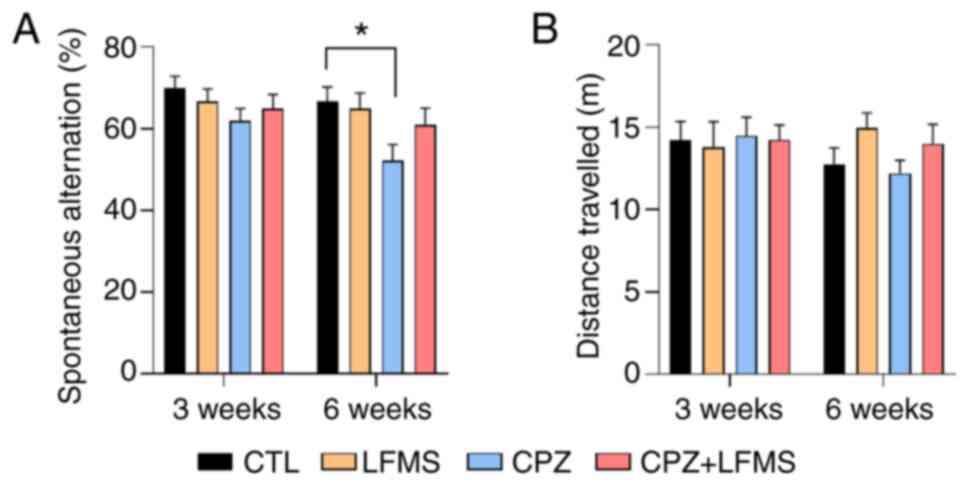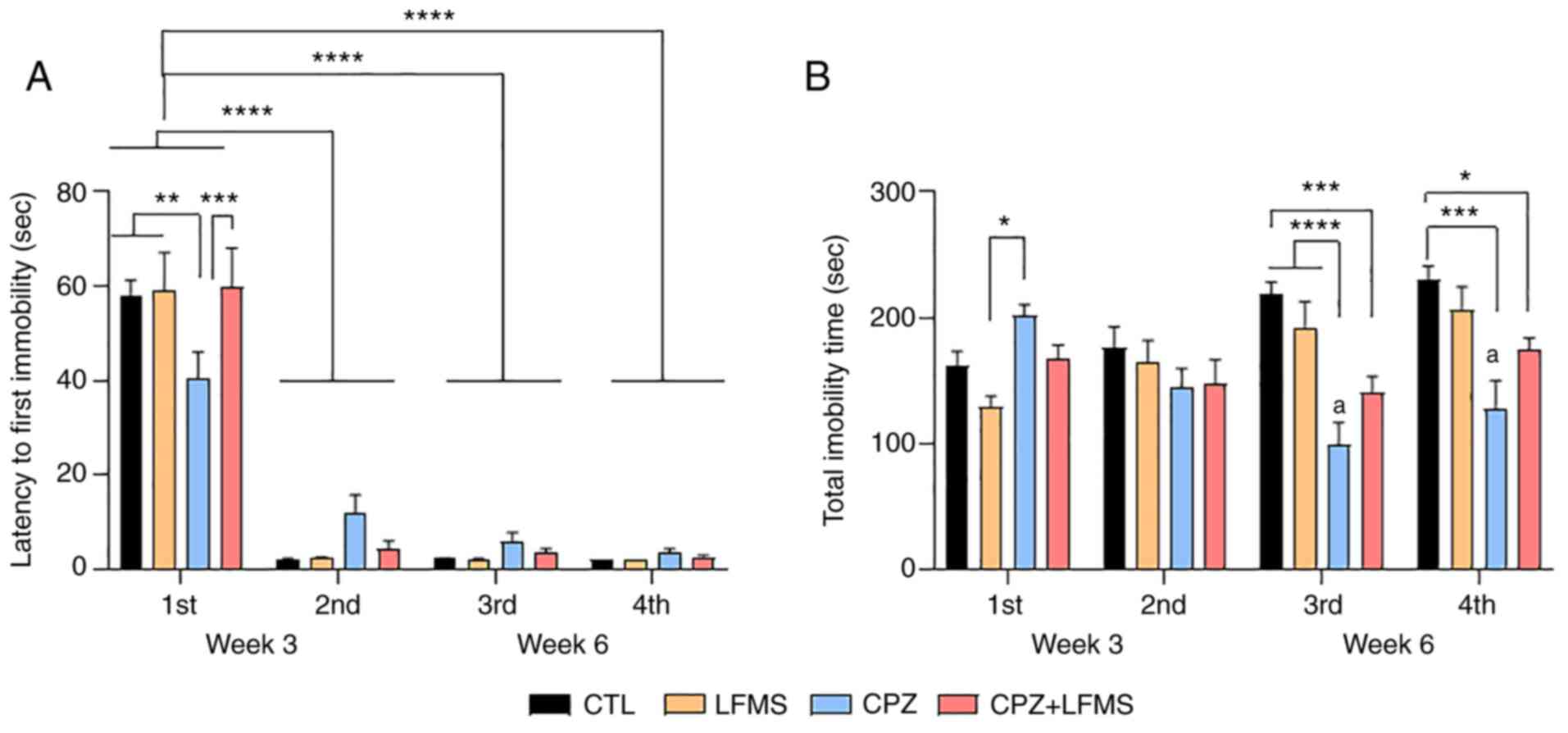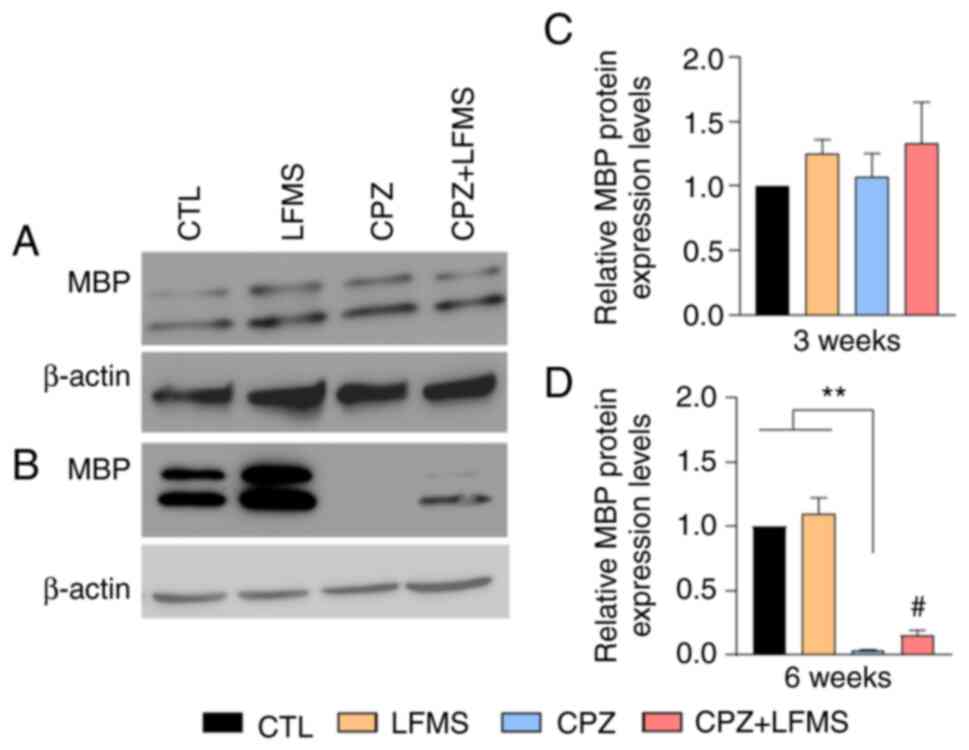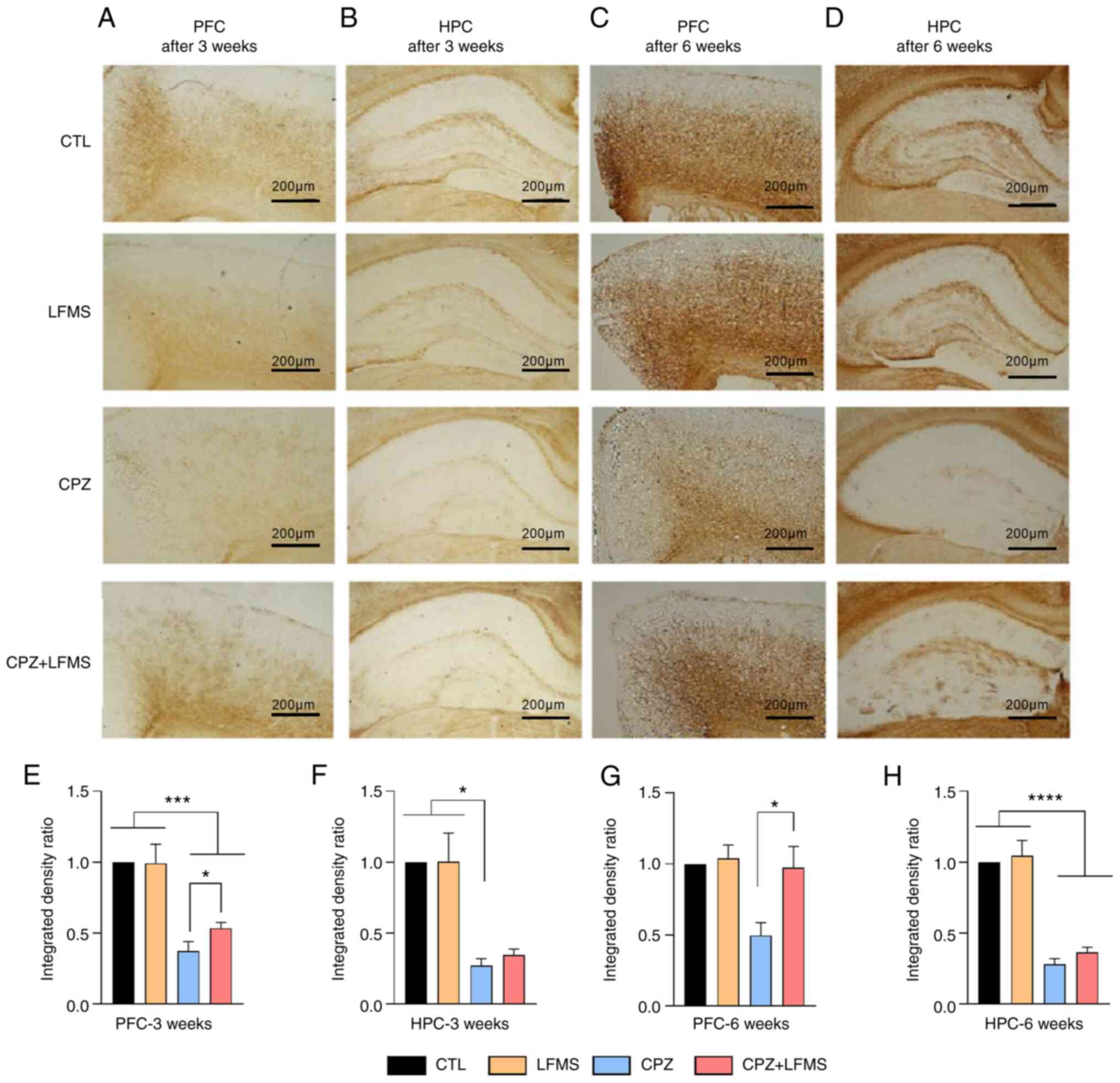|
1
|
Dendrou CA, Fugger L and Friese MA:
Immunopathology of multiple sclerosis. Nat Rev Immunol. 15:545–558.
2015.PubMed/NCBI View
Article : Google Scholar
|
|
2
|
Islas MÁM and Ciampi E: Assessment and
impact of cognitive impairment in multiple sclerosis: An overview.
Biomedicines. 7(22)2019.PubMed/NCBI View Article : Google Scholar
|
|
3
|
Walton C, King R, Rechtman L, Kaye W,
Leray E, Marrie RA, Robertson N, La Rocca N, Uitdehaag B, van der
Mei I, et al: Rising prevalence of multiple sclerosis worldwide:
Insights from the ATLAS of MS, third edition. Mult Scler.
26:1816–1821. 2020.PubMed/NCBI View Article : Google Scholar
|
|
4
|
Eijlers AJC, Van Geest Q, Dekker I,
Steenwijk MD, Meijer KA, Hulst HE, Barkhof F, Uitdehaag BMJ,
Schoonheim MM and Geurts JJG: Predicting cognitive decline in
multiple sclerosis: A 5-year follow-up study. Brain. 141:2605–2618.
2018.PubMed/NCBI View Article : Google Scholar
|
|
5
|
Patten SB, Marrie RA and Carta MG:
Depression in multiple sclerosis. Int Rev Psychiatry. 29:463–472.
2017.PubMed/NCBI View Article : Google Scholar
|
|
6
|
Salehpoor G, Rezaei S and Hosseininezhad
M: Quality of life in multiple sclerosis (MS) and role of fatigue,
depression, anxiety, and stress: A bicenter study from north of
Iran. Iran J Nurs Midwifery Res. 19:593–599. 2014.PubMed/NCBI
|
|
7
|
Kalb R, Feinstein A, Rohrig A, Sankary L
and Willis A: Depression and suicidality in multiple sclerosis: Red
flags, management strategies, and ethical considerations. Curr
Neurol Neurosci Rep. 19(77)2019.PubMed/NCBI View Article : Google Scholar
|
|
8
|
Shen Q, Lu H, Xie D, Wang H, Zhao Q and Xu
Y: Association between suicide and multiple sclerosis: An updated
meta-analysis. Mult Scler Relat Disord. 34:83–90. 2019.PubMed/NCBI View Article : Google Scholar
|
|
9
|
Carta MG, Paribello P, Anastasia A, De
Berardis D, Nardi AE and Fornaro M: Pharmacological management of
depression in patients with multiple sclerosis. Expert Opin
Pharmacother. 19:1533–1540. 2018.PubMed/NCBI View Article : Google Scholar
|
|
10
|
Vanotti S and Caceres FJ: Cognitive and
neuropsychiatric disorders among MS patients from Latin America.
Mult Scler J Exp Transl Clin. 3(2055217317717508)2017.PubMed/NCBI View Article : Google Scholar
|
|
11
|
Sumowski JF, Benedict R, Enzinger C,
Filippi M, Geurts JJ, Hamalainen P, Hulst H, Inglese M, Leavitt VM,
Rocca MA, et al: Cognition in multiple sclerosis: State of the
field and priorities for the future. Neurology. 90:278–288.
2018.PubMed/NCBI View Article : Google Scholar
|
|
12
|
Nebel K, Wiese H, Seyfarth J, Gizewski ER,
Stude P, Diener HC and Limmroth V: Activity of attention related
structures in multiple sclerosis patients. Brain Res. 1151:150–160.
2007.PubMed/NCBI View Article : Google Scholar
|
|
13
|
Guimarães J and Sá MJ: Cognitive
dysfunction in multiple sclerosis. Front Neurol.
3(74)2012.PubMed/NCBI View Article : Google Scholar
|
|
14
|
Feinstein A, Freeman J and Lo AC:
Treatment of progressive multiple sclerosis: What works, what does
not, and what is needed. Lancet Neurol. 14:194–207. 2015.PubMed/NCBI View Article : Google Scholar
|
|
15
|
Procaccini C, De Rosa V, Pucino V,
Formisano L and Matarese G: Animal models of multiple sclerosis.
Eur J Pharmacol. 759:182–191. 2015.PubMed/NCBI View Article : Google Scholar
|
|
16
|
Zhan J, Mann T, Joost S, Behrangi N, Frank
M and Kipp M: The cuprizone model: Dos and do nots. Cells.
9(843)2020.PubMed/NCBI View Article : Google Scholar
|
|
17
|
Hübner NS, Mechling AE, Lee HL, Reisert M,
Bienert T, Hennig J, von Elverfeldt D and Harsan LA: The
connectomics of brain demyelination: Functional and structural
patterns in the cuprizone mouse model. Neuroimage. 146:1–18.
2017.PubMed/NCBI View Article : Google Scholar
|
|
18
|
Hibbits N, Pannu R, Wu TJ and Armstrong
RC: Cuprizone demyelination of the corpus callosum in mice
correlates with altered social interaction and impaired bilateral
sensorimotor coordination. ASN Neuro. 1(e00013)2009.PubMed/NCBI View Article : Google Scholar
|
|
19
|
Zhang Y, Bi Y, Adebiyi O, Wang J,
Mooshekhian A, Cohen J, Wei Z, Wang F and Li XM: Venlafaxine
improves the cognitive impairment and depression-like behaviors in
a cuprizone mouse model by alleviating demyelination and
neuroinflammation in the brain. Front Pharmacol.
10(332)2019.PubMed/NCBI View Article : Google Scholar
|
|
20
|
Mi G, Gao Y, Liu S, Ye E, Li Y, Jin X,
Yang H and Yang Z: Cyclin-dependent kinase inhibitor flavopiridol
promotes remyelination in a cuprizone induced demyelination model.
Cell Cycle. 15:2780–2791. 2016.PubMed/NCBI View Article : Google Scholar
|
|
21
|
Shafi M, Stern AP and Pascual-Leone A:
Adding low-field magnetic stimulation to noninvasive
electromagnetic neuromodulatory therapies. Biol Psychiatry.
76:170–171. 2014.PubMed/NCBI View Article : Google Scholar
|
|
22
|
Posse S, Dager SR, Richards TL, Yuan C,
Ogg R, Artru AA, Müller-Gärtner HW and Hayes C: In vivo measurement
of regional brain metabolic response to hyperventilation using
magnetic resonance: Proton echo planar spectroscopic imaging
(PEPSI). Magn Reson Med. 37:858–865. 1997.PubMed/NCBI View Article : Google Scholar
|
|
23
|
Becker JE, Shultz EKB and Maley CT:
Transcranial magnetic stimulation in conditions other than major
depressive disorder. Child Adolesc Psychiatr Clin N Am. 28:45–52.
2019.PubMed/NCBI View Article : Google Scholar
|
|
24
|
Machado S, Arias-Carrion O, Paes F, Vieira
RT, Caixeta L, Novaes F, Marinho T, Almada LF, Silva AC and Nardi
AE: Repetitive transcranial magnetic stimulation for clinical
applications in neurological and psychiatric disorders: An
overview. Eurasian J Med. 45:191–206. 2013.PubMed/NCBI View Article : Google Scholar
|
|
25
|
Singh A, Erwin-Grabner T, Goya-Maldonado R
and Antal A: Transcranial magnetic and direct current stimulation
in the treatment of depression: Basic mechanisms and challenges of
two commonly used brain stimulation methods in interventional
psychiatry. Neuropsychobiology. 79:397–407. 2020.PubMed/NCBI View Article : Google Scholar
|
|
26
|
Camprodon JA: Therapeutic neuromodulation
for bipolar disorder-The case for biomarker-driven treatment
development. JAMA Netw Open. 4(e211055)2021.PubMed/NCBI View Article : Google Scholar
|
|
27
|
Rohan ML, Yamamoto RT, Ravichandran CT,
Cayetano KR, Morales OG, Olson DP, Vitaliano G, Paul SM and Cohen
BM: Rapid mood-elevating effects of low field magnetic stimulation
in depression. Biol Psychiatry. 76:186–193. 2014.PubMed/NCBI View Article : Google Scholar
|
|
28
|
Sekar S, Zhang Y, Mahabadi HM, Parvizi A
and Taghibiglou C: Low-field magnetic stimulation restores
cognitive and motor functions in the mouse model of repeated
traumatic brain injury: Role of cellular prion protein. J
Neurotrauma. 36:3103–3114. 2019.PubMed/NCBI View Article : Google Scholar
|
|
29
|
Dolgova N, Wei Z, Spink B, Gui L, Hua Q,
Truong D, Zhang Z and Zhang Y: Low-field magnetic stimulation
accelerates the differentiation of oligodendrocyte precursor cells
via non-canonical TGF-β signaling pathways. Mol Neurobiol.
58:855–866. 2021.PubMed/NCBI View Article : Google Scholar
|
|
30
|
Wang Z, Baharani A, Wei Z, Truong D, Bi X,
Wang F, Li XM, Verge VMK and Zhang Y: Low field magnetic
stimulation promotes myelin repair and cognitive recovery in
chronic cuprizone mouse model. Clin Exp Pharmacol Physiol.
48:1090–1102. 2021.PubMed/NCBI View Article : Google Scholar
|
|
31
|
Harbo HF, Gold R and Tintoré M: Sex and
gender issues in multiple sclerosis. Ther Adv Neurol Disord.
6:237–248. 2013.PubMed/NCBI View Article : Google Scholar
|
|
32
|
Voskuhl RR, Sawalha AH and Itoh Y: Sex
chromosome contributions to sex differences in multiple sclerosis
susceptibility and progression. Mult Scler. 24:22–31.
2018.PubMed/NCBI View Article : Google Scholar
|
|
33
|
Taylor LC, Gilmore W, Ting JPY and
Matsushima GK: Cuprizone induces similar demyelination in male and
female C57BL/6 mice and results in disruption of the estrous cycle.
J Neurosci Res. 88:391–402. 2010.PubMed/NCBI View Article : Google Scholar
|
|
34
|
Schiefer HB: Guide to the care and use of
experimental animals, volume 2. Can J Comp Med. 49(49)1985.
|
|
35
|
Canadian Council on Care (CCAC): Guide to
the Care and Use of Experimental Animals. Vol 1. 2nd edition.
Publication date:. 1993, Revision date: 2020. CCAC, Ottawa, ON,
2013. https://ccac.ca/Documents/Standards/Guidelines/Experimental_Animals_Vol1.pdf.
|
|
36
|
Gudi V, Moharregh-Khiabani D, Skripuletz
T, Koutsoudaki PN, Kotsiari A, Skuljec J, Trebst C and Stangel M:
Regional differences between grey and white matter in cuprizone
induced demyelination. Brain Res. 1283:127–138. 2009.PubMed/NCBI View Article : Google Scholar
|
|
37
|
Zhang Y, Adebiyi O, Wei Z, Mooshekhian A,
Truong D, Lavoie C, Cohen J, Zhang Z, Wang F, Bowen R and Li XM:
Low-field magnetic stimulation (LFMS) decreases cuprizone-induced
cognitive impairment and brain pathology in mice. Eur
Neuropsychopharmacol. 29:S227–S228. 2019.
|
|
38
|
Seibenhener ML and Wooten MC: Use of the
open field maze to measure locomotor and anxiety-like behavior in
mice. J Vis Exp. 6(e52434)2015.PubMed/NCBI View
Article : Google Scholar
|
|
39
|
Cleal M, Fontana BD, Ranson DC, McBride
SD, Swinny JD, Redhead ES and Parker MO: The Free-movement pattern
Y-maze: A cross-species measure of working memory and executive
functio. Behav Res Methods. 53:536–557. 2021.PubMed/NCBI View Article : Google Scholar
|
|
40
|
Yan G, Xuan Y, Dai Z, Shen Z, Zhang G, Xu
H and Wu R: Brain metabolite changes in subcortical regions after
exposure to cuprizone for 6 weeks: Potential implications for
schizophrenia. Neurochem Res. 40:49–58. 2015.PubMed/NCBI View Article : Google Scholar
|
|
41
|
Xu H, Yang HJ, Rose GM and Li XM: Recovery
of behavioral changes and compromised white matter in C57BL/6 mice
exposed to cuprizone: Effects of antipsychotic drugs. Front Behav
Neurosci. 5(31)2011.PubMed/NCBI View Article : Google Scholar
|
|
42
|
Rustay NR, Cronin EA, Curzon P, Markosyan
S, Bitner RS, Ellis TA, Waring JF, Decker MW, Rueter LE and Browman
KE: Mice expressing the Swedish APP mutation on a 129 genetic
background demonstrate consistent behavioral deficits and
pathological markers of Alzheimer's disease. Brain Res.
1311:136–147. 2010.PubMed/NCBI View Article : Google Scholar
|
|
43
|
Slattery DA and Cryan JF: Using the rat
forced swim test to assess antidepressant-like activity in rodents.
Nat Protoc. 7:1009–1014. 2012.PubMed/NCBI View Article : Google Scholar
|
|
44
|
Kraeuter AK, Guest PC and Sarnyai Z: The
forced swim test for depression-like behavior in rodents. Methods
Mol Biol. 1916:75–80. 2019.PubMed/NCBI View Article : Google Scholar
|
|
45
|
Porsolt PR, Le Pichon M and Jalfre M:
Depression: A new animal model sensitive to antidepressant
treatments. Nature. 266:730–732. 1977.PubMed/NCBI View Article : Google Scholar
|
|
46
|
Borsini F and Meli A: Is the forced
swimming test a suitable model for revealing antidepressant
activity? Psychopharmacology (Berl). 94:147–160. 1988.PubMed/NCBI View Article : Google Scholar
|
|
47
|
Petit-Demouliere B, Chenu F and Bourin M:
Forced swimming test in mice: A review of antidepressant activity.
Psychopharmacology (Berl). 177:245–255. 2005.PubMed/NCBI View Article : Google Scholar
|
|
48
|
Hascoët M and Bourin M: The forced
swimming test in mice: A suitable model to study antidepressants.
Neuromethods. 1:85–118. 2009.
|
|
49
|
Mul JD, Zheng L and Goodyear LJ: Validity
assessment of 5 day repeated forced-swim stress to model human
depression in young-adult C57BL/6J and BALB/CJ mice. eNeuro.
29(ENEURO.0201-16.2016)2016.PubMed/NCBI View Article : Google Scholar
|
|
50
|
Commons KG, Cholanians AB, Babb JA and
Ehlinger DG: The rodent forced swim test measures stress-coping
strategy, not depression-like behavior. ACS Chem Neurosci.
8:955–960. 2017.PubMed/NCBI View Article : Google Scholar
|
|
51
|
Titus HE, Chen Y, Podojil JR, Robinson AP,
Balabanov R, Popko B and Miller SD: Pre-clinical and clinical
implications of ‘Inside-Out’ vs. ‘Outside-In’ paradigms in multiple
sclerosis etiopathogenesis. Front Cell Neurosci.
14(599717)2020.PubMed/NCBI View Article : Google Scholar
|
|
52
|
Liu Q, Lv HW, Yang S, He YQ, Ma QR and Liu
J: NEP1-40 alleviates behavioral phenotypes and promote
oligodendrocyte progenitor cell differentiation in the hippocampus
of cuprizone-induced demyelination mouse model. Neurosci Lett.
725(134872)2020.PubMed/NCBI View Article : Google Scholar
|
|
53
|
Khalilian B, Madadi S, Fattahi N and
Abouhamzeh B: Coenzyme Q10 enhances remyelination and regulate
inflammation effects of cuprizone in corpus callosum of chronic
model of multiple sclerosis. J Mol Histol. 52:125–134.
2021.PubMed/NCBI View Article : Google Scholar
|
|
54
|
Vattakatuchery JJ, Rickards H and Cavanna
AE: Pathogenic mechanisms of depression in multiple sclerosis. J
Neuropsychiatry Clin Neurosci. 23:261–276. 2011.PubMed/NCBI View Article : Google Scholar
|
|
55
|
Shail MS: Neuropsychiatry in demyelination
disease: Using depression as a prodrome for early diagnosis and
treatment of multiple sclerosis. Cureus. 9(e1813)2017.PubMed/NCBI View Article : Google Scholar
|
|
56
|
Shin JS, Kwon YN, Choi Y, Lee JY, Lee YI,
Hwang JH, Choi SH and Kim SM: Comparison of psychiatric
disturbances in patients with multiple sclerosis and neuromyelitis
optica. Medicine (Baltimore). 98(e1718)2019.PubMed/NCBI View Article : Google Scholar
|
|
57
|
Shao Y, Peng H, Huang Q, Kong J and Xu H:
Quetiapine mitigates the neuroinflammation and oligodendrocyte loss
in the brain of C57BL/6 mouse following cuprizone exposure for one
week. Eur J Pharmacol. 765:249–257. 2015.PubMed/NCBI View Article : Google Scholar
|
|
58
|
Chang H, Liu J, Zhang Y, Wang F, Wu Y,
Zhang L, Ai H, Chen G and Yin L: Increased central dopaminergic
activity might be involved in the behavioral abnormality of
cuprizone exposure mice. Behav Brain Res. 331:143–150.
2017.PubMed/NCBI View Article : Google Scholar
|
|
59
|
Wood B, Van Der Mei IAF, Ponsonby AL,
Pittas F, Quinn S, Dwyer T, Lucas RM and Taylor BV: Prevalence and
concurrence of anxiety, depression and fatigue over time in
multiple sclerosis. Mult Scler. 19:217–224. 2013.PubMed/NCBI View Article : Google Scholar
|
|
60
|
Serra-de-Oliveira N, Boilesen SN, de
França Carvalho CP, LeSueur-Maluf L, de Lima Zollner R, Spadari RC,
Medalha CC and de Castro GM: Behavioural changes observed in
demyelination model shares similarities with white matter
abnormalities in humans. Behav Brain Res. 287:265–275.
2015.PubMed/NCBI View Article : Google Scholar
|
|
61
|
Franco-Pons N, Torrente M, Colomina MT and
Vilella E: Behavioral deficits in the cuprizone-induced murine
model of demyelination/remyelination. Toxicol Lett. 169:205–213.
2007.PubMed/NCBI View Article : Google Scholar
|
|
62
|
Xu H, Yang HJ, Zhang Y, Clough R, Browning
R and Li XM: Behavioral and neurobiological changes in C57BL/6 mice
exposed to cuprizone. Behav Neurosci. 123:418–429. 2009.PubMed/NCBI View Article : Google Scholar
|
|
63
|
Milanlioglu A, Özdemir PG, Cilingir V,
Gülec TÇ, Aydin MN and Tombul T: Coping strategies and mood
profiles in patients with multiple sclerosis. Arq Neuropsiquiatr.
72:490–495. 2014.PubMed/NCBI View Article : Google Scholar
|
|
64
|
Holubova M, Prasko J, Hruby R, Latalova K,
Kamaradova D, Marackova M, Slepecky M and Gubova T: Coping
strategies and self-stigma in patients with schizophrenia-spectrum
disorders. Patient Prefer Adherence. 10:1151–1158. 2016.PubMed/NCBI View Article : Google Scholar
|
|
65
|
Cotton SM, McCann TV, Gleeson JF, Crisp K,
Murphy BP and Lubman DI: Coping strategies in carers of young
people with a first episode of psychosis. Schizophr Res.
146:118–124. 2013.PubMed/NCBI View Article : Google Scholar
|
|
66
|
Grech LB, Kiropoulos LA, Kirby KM, Butler
E, Paine M and Hester R: Target coping strategies for interventions
aimed at maximizing psychosocial adjustment in people with multiple
sclerosis. Int J MS Care. 20:109–119. 2018.PubMed/NCBI View Article : Google Scholar
|
|
67
|
McCabe MP, McKern S and McDonald E: Coping
and psychological adjustment among people with multiple sclerosis.
J Psychosom Res. 56:355–361. 2004.PubMed/NCBI View Article : Google Scholar
|
|
68
|
Reising MM, Bettis AH, Dunbar JP, Watson
KH, Gruhn M, Hoskinson KR and Compas BE: Stress, coping, executive
function, and brain activation in adolescent offspring of depressed
and nondepressed mother. Child Neuropsychol. 24:638–656.
2018.PubMed/NCBI View Article : Google Scholar
|
|
69
|
Arnett PA, Higginson CI, Voss WD, Randolph
JJ and Grandey AA: Relationship between coping, cognitive
dysfunction and depression in multiple sclerosis. Clin
Neuropsychol. 16:341–355. 2002.PubMed/NCBI View Article : Google Scholar
|
|
70
|
Goretti B, Portaccio E, Zipoli V, Hakiki
B, Siracusa G, Sorbi S and Amato MP: Impact of cognitive impairment
on coping strategies in multiple sclerosis. Clin Neurol Neurosurg.
112:127–130. 2010.PubMed/NCBI View Article : Google Scholar
|
|
71
|
Bradshaw SD, Shumway ST, Dsauza CM, Morris
N and Hayes ND: Hope, coping skills, and the prefrontal cortex in
alcohol use disorder recovery. Am J Drug Alcohol Abuse. 43:591–601.
2017.PubMed/NCBI View Article : Google Scholar
|




















